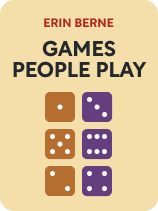

This article is an excerpt from the Shortform book guide to "Games People Play" by Eric Berne. Shortform has the world's best summaries and analyses of books you should be reading.
Like this article? Sign up for a free trial here .
Why do people play mind games? How can you tell that someone is playing a mind game on you?
In his 1964 classic Games People Play, Dr. Eric Berne theorizes that playing mind games is a part of psychological development that all people must grow past. He divided the mind games into seven different categories: 1) pseudo-small talk, 2) couples games, 3) sex games, 4) career games, 5) criminal games, 6) therapy games, and 7) positive games.
Let’s take a look at Berne’s categories of psychological mind games people play on each other.
Types of Mind Games
Berne gives multiple ways to classify psychological mind games. Below, we’ve reworked Berne’s scheme and updated his examples.
1. Pseudo-Small Talk
Pseudo-Small Talk develops out of small talk, when the friends of a group have drawn closer. These games often start as small talk, then develop some counterproductive or unhealthy quality. From Berne’s writing, it isn’t clear how this change occurs.
In the pastime “Water Cooler,” for example, two normal adults vent frustrations about their bosses. In the game version, they might start muttering insults in earshot of her, hoping to get a rise out of her. That would confirm their belief that she’s overbearing, though it might get them fired (remember that many games are self-destructive).
(Shortform note: It’s interesting to note that, as Berne describes it, previously unharmful small talk can become unhealthy games when people grow closer. Why is this? It may be that before we know someone well, we “put on a good face,” so as not to conceal our less wonderful qualities. However, once we start to trust someone, we open up more—which can lead to more authentic relating on the one hand, and exposure of our nastinesses as well. Berne might say that once you’ve engaged in small talk with someone long enough, you can tell what games they’ll play. So if you have games in common, you may only play them once you’re sure you won’t lose face by acting in a potentially unsavory way.)
2. Couples Games
Couples Games are the unhealthy habits that often develop between two people in a close, committed relationship. They can go on for years, and they may have a seriously negative effect on the players’ lives. Some are what today we’d call abuse.
Say for example a man holds the unconscious belief that “women deserve no respect.” He treats his partner poorly, gradually damaging her mental health. After a while depression sets in, and she starts gaining weight. Her partner then gets mad—“I can’t believe you’ve let yourself go like this.” His belief led him to create a situation that “proved” his belief, and he’s unconscious of it all along, Berne would say.
(Berne does say that “game” used as such isn’t meant to trivialize these situations. Instead, it refers to the regulated nature of such an interaction—there’s a discernible pattern it follows.)
(Shortform note: Whether abusers are aware of their behavior or not is up for debate. Stephanie A. Sarkis Ph.D., the author of Gaslighting: Recognize Manipulative and Emotionally Abusive People—and Break Free, suggests that some abusers are fully conscious of what they do and even study strategies to get better at it. On the other hand, plenty of emotional abuse seems to get meted out by people unconscious of what they’re doing. This can lead to difficult situations where, for example, an emotionally unavailable partner is hardly aware of what they’re doing. Automaticity, the phenomenon wherein habits become unconscious and second nature, may help to explain this. If Berne is right that our games develop in childhood, then they’d surely be automatic by adulthood.)
3. Sex Games
Sex Games flirt around sexual interaction, but instead offload the “satisfaction” of healthy sexuality to the game’s reward, according to Berne. In other words, people who play these derive pleasure from exchanges that stop short of actual sexual interaction.
Berne gives the example of “Kiss Off,” where Player A might believe, “Other people ought to want me, but can’t have me.” At a club or party, she teases and flirts mildly with other people. Someone pursues her, playing into her game, but she refuses advances beyond that initial flirtation.
(Shortform note: This is a fairly mild example of where Berne’s sexism seems to have influenced how he described some games. This category also demonstrates one of the weaknesses of Berne’s approach: Most of the games make reference to Freud’s psychosexual stages, which no longer enjoy much support. For example, it’s not much use to describe a woman’s flirtatious tendencies as deriving from unconscious “phallic” frustrations. Berne is inconsistent in his language choices—on the one hand, he argues that plain language, like in his game names, helps understanding. On the other hand, he still uses opaque Freudian jargon to diagnose many games. This may reflect Berne’s competing desires to make T.A. accessible through Games People Play, while also fighting for credibility in the academic community.)
4. Career Games
Career Games are long-term games, and may consume the player’s life. With serious career games, the player’s lifestyle, character, health, and financial situation can all fall apart around the game.
“Addict,” for example, can last for years, and it often derails the player’s life. Say Player A holds some belief like “I am worthless.” Various difficult circumstances (remember that each instance of a game has a unique history) lead Player A to substance abuse. This kicks off a destructive cycle that damages her health and position in society.
People may try to help her—likely playing ”Good Samaritan”—but according to Berne’s model, Player A will find some way to perpetuate her game. She may feel more worthless because people want to help. It confirms her belief, reinforcing her game.
This game-loop may take years off the player’s life, and it can remain unresolved without effective intervention.
(Shortform note: Though he doesn’t place it in this category, Berne characterizes homosexuality as a pathological lifestyle: He calls gay men “professional homosexuals,” as if to suggest that it’s a career game. And like career games, he argues that the game “Homosexuality” wastes time and handicaps the individual’s ability to live a good life. Psychiatry historically treated homosexuality as an illness to be cured. This is actually a step back from Freud, who wrote that same-sex desire is neither an illness nor something to be ashamed of. “Ego-syntonic Homosexuality” has since been removed from the Diagnostic and Statistical Manual of Mental Disorders, though Berne’s blatant homophobia lives on in Games People Play.)
Career games exemplify another point Berne makes: that people play their games at various intensities. He compares these to the severity of a crime: first-, second-, and third-degree.
- First-degree games are generally mild or benign. Many of us play “Morning Joe,” a very mild form of “Addict,” which at the most involves some grumpy mumbling.
- Second-degree games are preferably kept under wraps. “Day Drinker”, for example, may involve a flask, a concerned partner, and worsening health.
- Third-degree games lead to serious legal or fatal consequences. “Florida Man,”—a meme that mocks off-the-rails crimes perpetrated by men in Florida—can, for example, involve methamphetamine-fueled car chases that end in murder and the perpetrator’s arrest.
5. Criminal Games
Criminal Games are illegal activities as viewed through Berne’s framework. These games occur in the criminal underground and in prisons.
Berne’s example is “Want Out,” played by inmates who appear to want reduced sentences. Say Player A is an inmate who believes, “The world is uncertain, and uncertainty is frightening.” He behaves as if he wants to get out early, but when the opportunity arises he falls apart. His underlying fear, Berne says, causes him to sabotage his own chances because prison is certain, thus safe.
(Shortform note: Mental health treatment wasn’t widely available to inmates until at least the mid 20th century, despite the fact that mental illness is far more prevalent in prisons. Berne’s T.A. was one of the first therapies used, part of the Asklepieion program in Marion, Illinois. In this controversial program, therapists and trained inmates aggressively used the “games” framing to force inmates to think and behave differently, demanding that they admit their games and let go of them. Asklepieion found limited success and spread to at least ten additional prisons before several violent incidents in therapy groups led to the program’s end.)
6. Therapy Games
Therapy Games are played by mental health professionals and their patients. Berne says that these can prevent real therapy from taking place, because they give the illusion of progress.
For example, “Greenhouse” involves trained group therapy members who focus excessively on feelings. Player A may believe, “My feelings are precious, delicate things, not to be mishandled.” He presents each one like a rare blossom, and the group acts appropriately awed. Berne says they thus create a hothouse in which emotions are revered, but little real progress is made. The “Greenhouse” player, he states, simply builds a self-absorbed focus on their own emotions, reinforced by the group’s participation.
(Shortform note: Ineffective therapy is a real issue, and can even leave patients worse off than when they started. Part of the issue is similar to what Berne describes: Well-educated, trained clinicians overestimate their own effectiveness, and they tend to resist changes that could improve patient outcomes. This is a case of ego getting in the way of effective therapy, and highlights the fact that holding a therapy license doesn’t mean you’ve resolved your own psychological dissonance (one study, for example, found that around two-thirds of clinicians experienced mental health issues).)
7. Positive Games
Positive Games are generally productive, not destructive. Because games are deceptive by definition, Berne says that it’s difficult to identify wholly positive games. Instead, these games have a beneficial effect that offsets their negatives.
“Mission Trip,” for example, involves financially privileged, college-age Americans going to less developed countries. They build schools, take pictures with the locals, and feel that they’re doing some good in the world.
Using Berne’s model, folks who play “Mission Trip” (and related games like “Peace Corps” and “Teaching English Abroad”) unconsciously do so to confirm some belief like, “I am a good person.” In that way the trip is for their own benefit, but because these trips do have net positive outcomes, they’re “good” games.
We’ve based these tongue-in-cheek game names on Berne’s style. He states that colloquial names communicate the character of the game more effectively than technical names. For example, compare “I Can’t Believe Them” with something like “verbalizing projected oral sadism.”

———End of Preview———
Like what you just read? Read the rest of the world's best book summary and analysis of Eric Berne's "Games People Play" at Shortform .
Here's what you'll find in our full Games People Play summary :
- The many ways that we relate to one another through “games”
- Why you might be missing out on the fulfillment of game-free living
- How to identify and overcome unhealthy games







I am a 51 year old man. I believe I have beome the main character of someone’s sick idea of a game. I was gaslighted and manipulated for 2+ years until my “friend” and I became non friends anymore. He and others would start in as soon as I got home from work…with these same people let me add, most got out early. Always having some plans for the night. As soon as I would get home, some times before I got inside someone would call out. And then it was ON. I would spend the entire night looking for whomever it was. Sometimes I recognized the voice, and believed they were just toying with me, like grown up hide and seek. What I’ve come to understand now is they re trying to destroy me. It’s made me incredibly paranoid. I seem to be much more well known far beyond my pizza delivery job. “Look it’s him” ,”hey mommy is that him?”” Hoosh it’s not polite to stare” “hey it’s kevin- hi kevin” we are not suppose to speak to him” even so much as to somehow connect with guests at my home on line asking in private if they would like to choose to participate in their little exorcise…..I mean, come on! There seems to be some penalty or repercussions for not playing or for saying anything to me about what’s going on…..
So, does this resonate? Anyone else living with this? They have pushed me to the point of suicide many times, with no intervention what so ever.almost like it’s the goal. Secondly, it does sound like a good premise for a real life battle of the wits or for the soul…
But what’s happening to me IS NO GAME. Someone seems to have to die.. this ex pal is ruthless and cruel. In his real life he was very insignificant..now he seems to be thee “Guy”.
He’s so popular in my neighborhood, gated senior community, he’s 32 by the way, and people have started acting off with me, also almost all have done some kind of background on me according to Google.
I wonder what the Grand prize would be…..
Forgive me if I went off track..I don’t get my rest anymore what with all the sleep depriving activities at my house over the last few years….
So, whata ya think?
Kevin. Beaumont CA.
Have a lovely day.